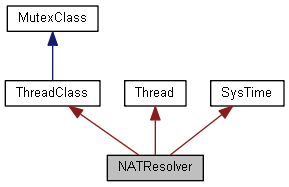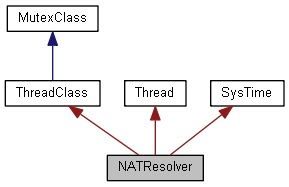#include <NATResolver.h>


Public Types | |
| enum | { kDefaultPort = 4002 } |
Public Member Functions | |
| bool | Start (void) |
| bool | Stop (void) |
| void | SetAutomaticThreadStop (const bool allow=true) |
| When the NATResolver becomes inactive for a period of time this allows the thread to stop processing. | |
| void | SetAutomaticHostSocketReads (const bool allow=false) |
| void | SetEncryptionKey (const void *data, const int length) |
| bool | BeginHosting (t_XPSocket *socket) |
| bool | BeginAdvertise (t_XPSocket *socket, void *userPointer, const bool isAdvertised, const int globalID, const int sessionID, const int nonceID, const bool externalHost=true, const XPAddress *optionalHost=0, const bool persistant=false) |
| Advertises a socket with a set of identifying numbers (isAdvertised, globalID, nonceID) which should be globally unique for this socket. More... | |
| bool | BeginResolve (t_XPSocket *socket, void *userPointer, const bool isAdvertised, const int globalID, const int sessionID, const int nonceID, const bool tryExternalHost=true, const XPAddress *optionalHost=0, const XPAddress *optionalFirstTargetTry=0) |
| void | ForgetSocket (const t_XPSocket *socket) |
| Removes the socket from the NATResolver index. | |
| void | ForgetUserPointer (const void *userPointer) |
| Forgets all sockets with the same userPointer. | |
| void | ForgetResolve (t_XPSocket *socket, const bool isAdvertised, const int globalID, const int sessionID, const int nonceID) |
| Removes the specific resolve request. | |
| bool | CallbackParsePacketData (t_XPSocket *socket, const XPAddress &addr, void *data, size_t length) |
| void | SetServer (const XPAddress &address) |
| virtual void | CallbackResolveFailed (t_XPSocket *socket, void *userPointer, const int titleID, const bool isAdvertised, const int globalID, const int sessionID, const int nonceID) |
| A virtual callback that is triggered when a NAT resolve attempt fails. | |
| virtual void | CallbackResolveResult (t_XPSocket *socket, void *userPointer, const XPAddress &targetAddress, const int titleID, const bool isAdvertised, const int globalID, const int sessionID, const int nonceID) |
| virtual void | CallbackExternalAddressKnown (t_XPSocket *socket, void *userPointer, const XPAddress &externalAddress, const int titleID, const bool isAdvertised, const int globalID, const int sessionID, const int nonceID) |
| A virtual callback that is triggered when an advertised socket it told the external address from being advertised to an external host. | |
Detailed Description
This NAT resolver uses incoming data to respond to queries for NAT negotiation. It can also make requests for NAT negotiation. This class can also make queries to NAT resolve. This class is used by TransportNATUDP.
Member Function Documentation
| bool BeginAdvertise | ( | t_XPSocket * | socket, |
| void * | userPointer, | ||
| const bool | isAdvertised, | ||
| const int | globalID, | ||
| const int | sessionID, | ||
| const int | nonceID, | ||
| const bool | externalHost = true, |
||
| const XPAddress * | optionalHost = 0, |
||
| const bool | persistant = false |
||
| ) |
Advertises a socket with a set of identifying numbers (isAdvertised, globalID, nonceID) which should be globally unique for this socket.
If the NATResolver thread has not started then this calls Start() first.
- Parameters
-
socket The socket to advertise. userPointer A user pointer passed to NATResolver callbacks. isAdvertised Can be true or false indicating if the socket is advertised with a game server. If being used by TransportNATUDP this detects if AdvertiseClient is advertising a connection. globalID Must a globally unique number, for example a hash of the public IP address. If being used by TransportNATUDP this uses the advertised ID from AdvertiseClient or the currently logged in userID. nonceID Must be a locally unique number, for example the value from NOnceGen::GetNOnce() or the value of the socket pointer cast to an int. If being used by TransportNATUDP this uses the value from NOnceGen::GetNOnce(). externalHost If true then this will attempt to ask an external server to help with resolving. The server is set by SetServer() or by default uses the RNLobby NATResolver server. optionalHost An optional host to contact to help with resolving. persistant Keeps the socket alive for longer in the NATResolver index.
| bool BeginHosting | ( | t_XPSocket * | socket | ) |
Hosts a NATResolver server instance on this socket. The socket is automatically polled is SetAutomaticHostSocketReads(true) is used. If the NATResolver thread has not started then this calls Start() first.
| bool BeginResolve | ( | t_XPSocket * | socket, |
| void * | userPointer, | ||
| const bool | isAdvertised, | ||
| const int | globalID, | ||
| const int | sessionID, | ||
| const int | nonceID, | ||
| const bool | tryExternalHost = true, |
||
| const XPAddress * | optionalHost = 0, |
||
| const XPAddress * | optionalFirstTargetTry = 0 |
||
| ) |
Starts resolving a connection between this socket and the socket advertised with the set of identifying numbers (isAdvertised, globalID, nonceID). Either CallbackResolveFailed() or CallbackResolveResult() will be called. If the NATResolver thread has not started then this calls Start() first.
- Parameters
-
socket The socket to resolve. userPointer A user pointer passed to NATResolver callbacks. isAdvertised A value set by BeginAdvertise(). globalID A value set by BeginAdvertise(). nonceID A value set by BeginAdvertise(). tryExternalHost If true then this will attempt to ask an external server to help with resolving. The server is set by SetServer() or by default uses the RNLobby NATResolver server. optionalHost An optional host to contact to help with resolving. optionalFirstTargetTry An optional address to try first, this could be the local LAN IP address.
| bool CallbackParsePacketData | ( | t_XPSocket * | socket, |
| const XPAddress & | addr, | ||
| void * | data, | ||
| size_t | length | ||
| ) |
The user may call this function when a packet is received on a socket that where NAT packets can potentially be received. For example, internally the NATUDP Transport uses a reliable UDP manager which calls a hook function, if it exists after is has been installed by RNLobby::RegisterDefaultTransports(), this function then calls CallbackParsePacketData() for any packets that arrive allowing the extension NATUDP transport to automatically NAT resolve without needed an explicit library dependancy between RNXPURL and RNLobby. If the NATResolver thread has not started then this calls Start() first.
- Returns
- True if the packet is a NAT packet, which implies the packet data doesn't need to be processed by the receiver.
- False if the packet isn't a NAT packet.
|
virtual |
A virtual callback that is triggered when a NAT resolve attempt succeeds. /param targetAddress The target address the socket can send packets to.
| void SetAutomaticHostSocketReads | ( | const bool | allow = false | ) |
Allows the host socket set by BeginHosting to be automatically read and all packets received on that socket to be parsed. Also calls SetAutomaticThreadStop(false)
| void SetEncryptionKey | ( | const void * | data, |
| const int | length | ||
| ) |
Sets the encryption key to be used by all queries for this server.
- Parameters
-
data The data to use as a seed for the key. This can be NULL to use the default key. length The length of the data to use for creating the key.
| void SetServer | ( | const XPAddress & | address | ) |
Sets the address and port of the server. The default for the instance of the class is localhost and port NATResolver::kDefaultPort or the address resolved by a successful BackendClient::Start().
- Parameters
-
address The new address and port number to use for the server
| bool Start | ( | void | ) |
Starts the NAT resolver thread.
- Returns
- Success returns true, failure returns false.
| bool Stop | ( | void | ) |
Stops the NAT resolver thread.
- Returns
- Success returns true, failure returns false.
 1.8.6
1.8.6